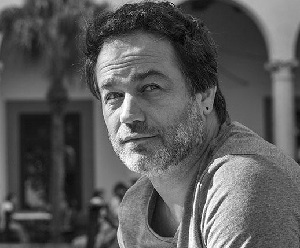 Our marvelous city, ancient, cheerful, spectacular, continues to captivate with its charm all those who visit. Argentine actor Gastón Pauls was in Cuba for the first time in the 2000 and fervently insists that he makes films to come to Havana. “Nineteen years ago I had the opportunity to open the festival with the presence of Fidel in the front row; it was very moving,” and since then, he has come 17 times.
Our marvelous city, ancient, cheerful, spectacular, continues to captivate with its charm all those who visit. Argentine actor Gastón Pauls was in Cuba for the first time in the 2000 and fervently insists that he makes films to come to Havana. “Nineteen years ago I had the opportunity to open the festival with the presence of Fidel in the front row; it was very moving,” and since then, he has come 17 times.
Pauls began his relationship with the International Festival of New Latin American Cinema with the film Nueces para el amor, which on that occasion won the Grand Coral for the best film of the event.
He remembers how surprised he was, on that trip, “to see how Cubans lived and watched a movie. There is no place in the world that has that level of passion, knowledge and love for Latin American cinema, and I couldn’t believe it.”
In 2019, he arrives with El Príncipe, which is competing in the debut section, and La espuma de los días, as part of the exhibition América en perspectiva. Referring to the latter, directed by Fernando Timossi, he confesses that his greatest satisfaction was playing a Cuban character and collaborating with “first-rate” actors such as Corina Mestre, Liéter Ledesma, Alicia and Fernando Hechavarría. “I am very proud and happy because Latin American cinema always costs a great deal, and every film that is released is a victory.”
El Príncipe is a co-production by Chile, Argentina and Belgium, “a film that takes place in a prison, and where paradoxically many men can be free.” It is a reflection on a society where prejudice and homophobic postures still persist, which Pauls proudly presents in this festival, for him, “a beacon since its creation, because when there were many military dictatorships across Latin America, this was the place where the darkness could be stated, denounced, and brought to light. Today, when the right wing wants to ride hard and in many places the media is carrying out coups, the festival has more power than it did 40 years ago.”
Pauls has always valued Latin American cinema. “For me it is cinema about the world, made by Latin Americans, it is how we see and how we see ourselves. The maxim this year rightly states that in several Latin American countries people are being blinded, so our cinema has the duty to continue observing and telling what it sees.”
he duty to continue observing and telling what it sees.”
(Granma)